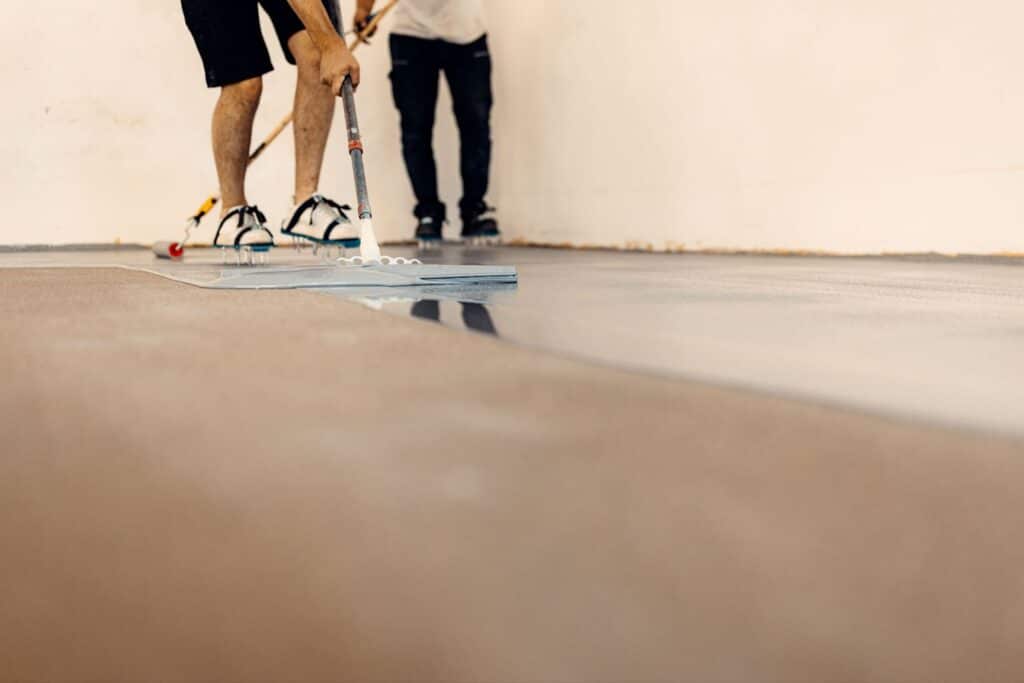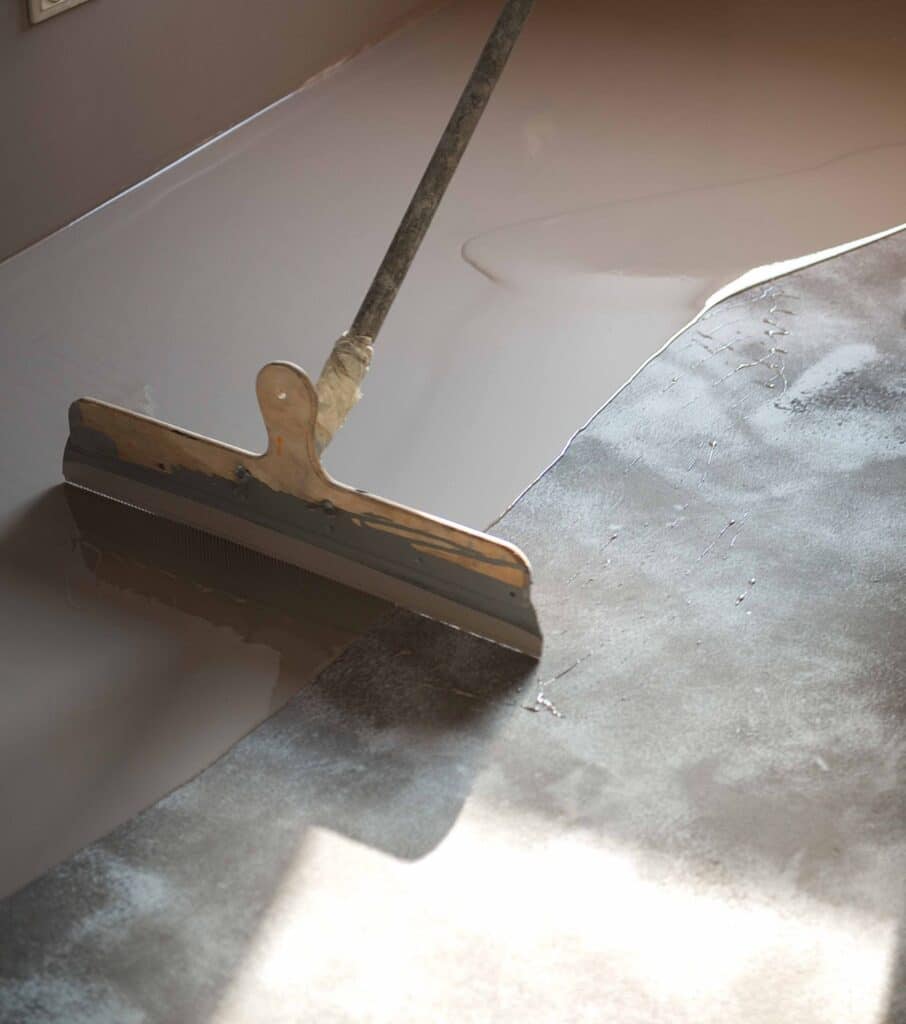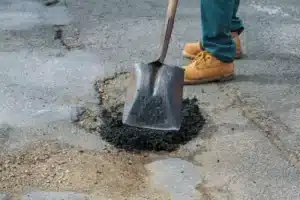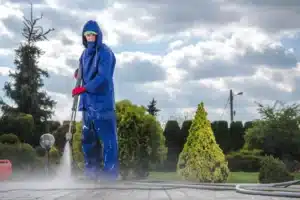Is sealing your stained concrete floors necessary? It’s a question that many homeowners ask themselves when trying to achieve both durability and a beautiful finish. Fortunately, our expert guide is here to help! In this comprehensive article, we’ll take you through all the essential steps and benefits of sealing your concrete floors, equipping you with the knowledge and skills you need to achieve that polished look that will stand the test of time.
Why is Concrete Sealing Important?
Concrete sealers are essential for those who want to protect their concrete surfaces for a long time and enhance their appearance. They act as a barrier against stains, moisture, and wear, keeping your stained concrete floors pristine for several years. Sealing not only prolongs the life of your concrete surfaces but also ensures that they look good for longer. If you are concerned about your stained concrete floors’ longevity and aesthetic appeal, sealing them is a must. It’s not just a recommended practice but also a cost-effective option in the long run. It’s better to opt for a sealer instead of relying on a polish or no sealer. Sealing protects the surface and enhances the color vibrancy, especially for decorative stained concrete surfaces.
Why Choose Us for Concrete Sealing and Unlock the Full Potential of Your Concrete Surfaces
At Matt The Driveway Guy, we’re not just another concrete sealing company. We’re your partners in enhancing and protecting your investment. Our state-of-the-art sealing techniques are designed to preserve your pavers and concrete, ensuring they withstand the elements and retain their beauty for years. With a commitment to quality, competitive pricing, and unparalleled customer service, we offer a holistic solution to all your concrete sealing needs in Greenville. Choose us to safeguard your surfaces and revel in the brilliance of well-protected, vibrant concrete and pavers.
The Benefits of Sealing Your Concrete Floors
Sealing concrete floors is beneficial for more than just protection. A well-applied sealer can enhance the appearance of your home and create a glossy and inviting look for your floors. Decorative concrete can also look even more appealing with the right sealant.
Functionally, a sealed concrete floor repels oil and grease, making cleaning easier. The sealed surface is also less prone to dusting, which prevents abrasion and color fading caused by UV rays. A sealed floor is durable and can withstand wear and tear, whether it’s in a busy garage or a peaceful living area.
In high-moisture environments, sealing the floor can also prevent the growth of mold and bacteria, which contributes to a healthier living environment. If you’re considering whether or not to seal your concrete floors, remember that it can significantly impact the upkeep and ambiance of your home.
Why You Should Seal Your Stained Concrete Floor
Sealing your stained concrete floor is essential in maintaining its beauty, durability, and longevity. Stained concrete floors offer an attractive and versatile flooring option for both residential and commercial properties, but they require proper care to ensure they remain in top condition. Sealing your stained concrete floor provides the following benefits:

Enhances Durability
Sealing your stained concrete floor enhances its durability. The sealer is a protective layer that shields the concrete from wear and tear, abrasions, and impact damage. This is particularly important in high-traffic areas where the floor is subjected to constant use. A sealed floor is more resistant to scratches, chips, and stains, ensuring it remains pristine for longer.
Protects Against Stains and Spills
Concrete is porous, which can absorb liquids, leading to staining and damage. Sealing the floor creates a barrier that prevents spills from penetrating the surface. This is especially beneficial in areas prone to spills, such as kitchens, dining rooms, and commercial spaces. Sealed floors are easier to clean, and spills can be wiped away without leaving a stain, maintaining the floor’s aesthetic appeal.
Enhances Color and Adds Sheen
Sealing a stained concrete floor protects it and enhances its appearance. The sealer can intensify the stain’s color, making it more vibrant and noticeable. Sealers come in various sheen levels, from matte to high-gloss, allowing you to choose the finish that best complements your space. This added sheen improves the floor’s look and contributes to the room’s overall ambiance.
Prevents Moisture Damage
Moisture can be detrimental to concrete floors, leading to issues such as mold, mildew, and efflorescence. Sealing your stained concrete floor prevents moisture from penetrating the surface, protecting it from these potential damages. This is particularly crucial in basements, bathrooms, and other moisture-prone areas.
Cost-Effective Maintenance
Maintaining a sealed concrete floor is easier and more cost-effective than an unsealed one. Sealed floors require less frequent deep cleanings and are more resistant to damage that could lead to costly repairs. Regular sweeping and mopping are needed to keep a sealed concrete floor looking its best, saving you time and money in the long run.
How to Prepare Your Stained Concrete Floors for Sealing
Having a clean and polished concrete surface is essential for a successful sealing job. Therefore, it is crucial to ensure that the surface is free from dirt, debris, and existing coatings before applying the sealer. This will guarantee even application and optimal results that do justice to your decorative choices. After cleaning, make sure to patch any cracks or chips to achieve a smooth canvas. These preparation steps are the groundwork for a flawless finish, and they significantly improve the sealer’s adhesion and your stained concrete floor’s integrity. Additionally, it is essential to check for moisture retention in the concrete, as excessive dampness can hinder the sealing process and may require a moisture-resistant sealer. The last thing you want is a sealant that fails to bind due to moisture issues.
Selecting the Right Sealer for Your Flooring Project
The process continues after the stain application; selecting a befitting sealer is just as vital. Whether you opt for a water-based sealer for its eco-friendly properties or an epoxy sealer known for its toughness, the choice hinges on the floor’s function and your aesthetic preference. Consider the wearability of the sealer, especially if your floor will endure high traffic or heavy use. Certain sealers might necessitate reapplication more frequently than others, so choose one that aligns with your willingness to maintain it. If you find yourself weighing “Which sealer concrete choice fits my floor?” consult with an expert like Matt The Driveway Guy, who can guide you toward the ideal selection for your living environment.
How to Apply Sealer Like a Pro
Applying sealer may seem daunting, but rest assured, it can be mastered by following the right techniques. Begin with a thin, even layer, using a roller or sprayer to distribute the sealer uniformly across the surface. For those attempting a DIY application, give ample time for the sealer to dry between layers. The conditions of your environment – temperature, humidity, ventilation – play a pivotal role in drying time and the overall curing process. Do not rush this phase. A hasty job can lead to uneven coverage and diminish the sealer’s effectiveness.

The Importance of Non-Slip Additives for Safe-Sealed Floors
In the interest of safety, the addition of non-slip additives to your sealer is worth considering, especially in areas prone to splashes or spills. The texture these additives impart can provide traction, preventing accidents on wet concrete floors. Such an approach is recommended for commercial settings or homes with vulnerable residents, where the risk of slipping should be mitigated. An ounce of prevention in the form of a non-skid additive can make your floors safer for everyone. If you require assistance with non-slip coatings, contact a reliable expert. Local to Greenville, SC, Matt The Driveway Guy is equipped with the know-how to make your floors stunning and secure.
Maintaining Your Sealed Concrete: Longevity Tips and Tricks
To preserve that pristine, just-sealed appearance, routine care and a gentle touch are essential. Regular cleaning with non-abrasive products can keep the floor in prime condition without eroding the sealer. Avoid strong chemicals or abrasive tools, which can wear down the sealer over time. Instead, a simple pH-neutral cleaner and soft mop can work wonders. Spot clean spills promptly to prevent stains from seeping through the sealant, ensuring your sealed floors remain impeccable. A reapplication of sealer every couple of years might be necessary for outdoor surfaces exposed to the elements. Maintaining that sealed barrier is crucial for the enduring splendor of your floors.
Common Concrete Sealing Mistakes to Avoid
Navigating the possibility of errors is part of the sealing journey. One common blunder is applying sealer concrete too thickly, which can obstruct its ability to breathe, leading to a host of issues such as blistering or delamination. Another pitfall is neglecting the cure time of new concrete before sealing. Patience here is key; rushing to seal too soon can trap moisture, adversely affecting the adhesion and overall performance of the sealer. Moreover, inadequate concrete preparation – neglecting cleaning, patching, or ensuring a uniform stain application – can culminate in a lackluster finish. Thoroughly research or consult professionals to forestall these stumbling blocks.
Frequently Asked Questions
Q: What is concrete sealing?
A: Concrete sealing involves applying a protective coating to concrete surfaces to enhance their durability and longevity and prevent damage from moisture, chemicals, and wear.
Q: Can you stain concrete in different colors?
A: We offer concrete staining in various colors to match your aesthetic preferences, using high-quality products for vibrant and long-lasting results.
Q: How long do sealers last?
A: The lifespan of a sealer can vary from 2 to 5 years, depending on the type used. We recommend the most suitable product for maximum protection and durability based on your needs.
Final Thoughts
The notion of sealing stained concrete can be an unveiling of potential, not just a preservation act. With the right approach, materials, and care, a sealed concrete surface can be a centerpiece, a statement of both resilience and style. Whether you seize the DIY spirit or prefer to harness the skill of an expert like Matt The Driveway Guy, the result should be a floor that reflects your pride and joy in your home. At Matt The Driveway Guy, we have the expertise to help you achieve your vision for a more beautiful and enduring floor. So, choose us for all your concrete sealing needs, and let us help you create a space you’ll love.






